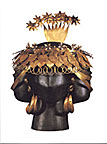 One of the members of my Historical Novel Society discussion list mentioned that she was working on a novel about ancient Sumer. This culture fascinates me, especially after I attended the "Treasures of the Royal Tombs of Ur" exhibit when it was displayed at the University of Chicago's Oriental Museum a couple of years ago. Although the artifacts in the exhibit are dated to the Early Dynastic Period ending in 2370 B.C.E., they were excavated from a cemetary containing tombs dating all the way back to 4500 B.C.E. The new novel will be set during the Jemdat Nasr period (3200 BCE to 2900 BCE).
One of the members of my Historical Novel Society discussion list mentioned that she was working on a novel about ancient Sumer. This culture fascinates me, especially after I attended the "Treasures of the Royal Tombs of Ur" exhibit when it was displayed at the University of Chicago's Oriental Museum a couple of years ago. Although the artifacts in the exhibit are dated to the Early Dynastic Period ending in 2370 B.C.E., they were excavated from a cemetary containing tombs dating all the way back to 4500 B.C.E. The new novel will be set during the Jemdat Nasr period (3200 BCE to 2900 BCE).
I found this excellent overview of the culture on the web:
"Sumer may very well be the first civilization in the world (although long term settlements at Jericho and Çatal Hüyük predate Sumer and examples of writing from Egypt and the Harappa, Indus valley sites may predate those from Sumer). From its beginnings as a collection of farming villages around 5000 BCE, through its conquest by Sargon of Agade around 2370 BCE and its final collapse under the Amorites around 2000 BCE, the Sumerians developed a religion and a society which influenced both their neighbors and their conquerors. Sumerian cuneiform, the earliest written language, was borrowed by the Babylonians, who also took many of their religious beliefs. In fact, traces and parallels of Sumerian myth can be found in Genesis." - Christopher Siren, Sumerian Mythology.
No comments:
Post a Comment